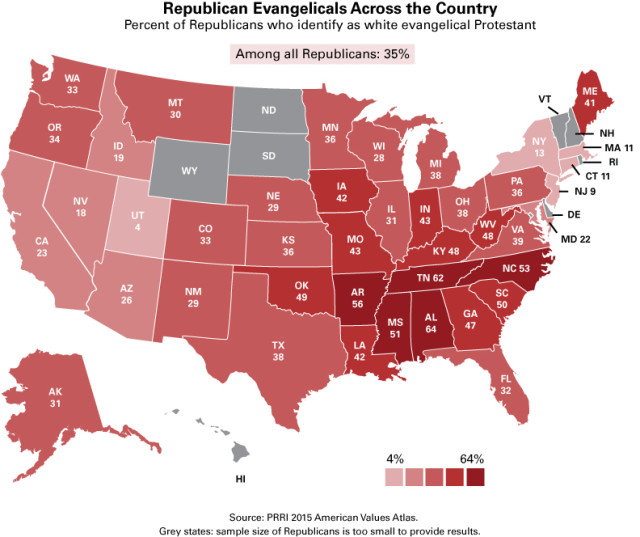In nearly every conceivable way imaginable, Republican hopeful Donald Trump’s campaign has confounded pundits, political scientists, and journalists alike and broken traditional election etiquette. His success among white evangelical Protestants, despite a personal history that could have repelled many evangelical voters, is just one important example. In 15 primary states for which exit and entrance polling is available, Trump has beat his closest competitor by an average of seven percentage points among white evangelical Protestants. This has been true in both Mississippi, where white evangelical Protestants made up 76 percent of all ballots cast, and New Hampshire, where they accounted for less than one-quarter (23 percent) of all Republican votes.
The American Values Atlas shows the number of Republicans in each state who are white evangelical Protestant. While they are numerous across the South, they make up a large proportion outside the South as well.
Looking ahead, Trump’s advantage among white evangelical Protestant voters bodes well for his continued success. Although the location of future primary contests shifts notably northward—and a bit eastward and westward—white evangelical Protestants will remain a potent force in Republican politics across the Midwest, West Coast, and mid-Atlantic. In Ohio, an important winner-take-all state that votes on March 15, white evangelical Protestants make up 38 percent of all Republicans in the state. Later voting states like Pennsylvania are also likely to see considerable turnout by evangelicals. Thirty-six percent of Republicans in Pennsylvania identify as white evangelical Protestant.
What’s more, there are signs that white evangelical Protestants have been voting at substantially higher rates than other Republicans. South Carolina, where white evangelical Protestants account for half (50 percent) of all Republicans in state, saw two-thirds of all primary votes cast by white evangelical Protestant voters. If these patterns hold, white evangelicals will continue to exert a substantial impact in choosing the Republican nominee, even as the proportion of white evangelical Protestants dips in later voting states.
There is certainly no guarantee that Trump will continue to lead among white evangelical Protestant voters, as the group has not behaved like a cohesive voting bloc and has been anything but predictable. Instead, socio-economic fault lines and other divisions appear to be pushing evangelical voters in different directions and toward different candidates. A poll conducted late last fall shows Trump performing much better among white working-class evangelicals than those with a college degree: 37 percent of the former group support Trump, compared to only 15 percent of the latter.
To explore the unique religious landscape of your state, check out the American Values Atlas.
Note: sample size of Republicans is too small to provide results in grey states.
